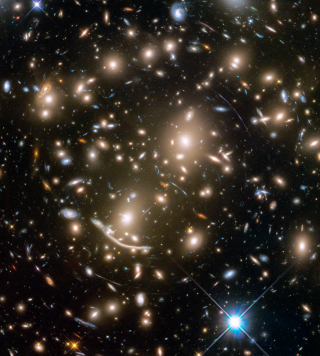Bibcode
Doherty, M.; Arnaboldi, M.; Das, P.; Gerhard, O.; Aguerri, J. A. L.; Ciardullo, R.; Feldmeier, J. J.; Freeman, K. C.; Jacoby, G. H.; Murante, G.
Bibliographical reference
Astronomy and Astrophysics, Volume 502, Issue 3, 2009, pp.771-786
Advertised on:
8
2009
Journal
Citations
74
Refereed citations
57
Description
Aims: We study the kinematics and dynamics of the extreme outer halo of
M 87, the central galaxy in the Virgo cluster, and its transition to the
intracluster light (ICL). Methods: We present high resolution
FLAMES/VLT spectroscopy of intracluster planetary nebula (PN)
candidates, targeting three new fields in the Virgo cluster core with
surface brightness down to μB = 28.5. Based on the
projected phase space information (sky positions and line-of-sight
velocities) we separate galaxy and cluster components in the confirmed
PN sample. We then use the spherical Jeans equation and the total
gravitational potential as traced by the X-ray emission to derive the
orbital distribution in the outer stellar halo of M 87. We determine the
luminosity-specific PN number for the M 87 halo and the ICL from the
photometric PN catalogs and sampled luminosities, and discuss the origin
of the ICL in Virgo based on its measured PN velocities. Results:
We confirm a further 12 PNs in Virgo, five of which are bound to the
halo of M 87, and the remainder are true intracluster planetary nebulas
(ICPNs). The M 87 PNs are confined to the extended stellar envelope of M
87, within a projected radius of ~160 kpc, while the ICPNs are scattered
across the whole surveyed region between M 87 and M 86, supporting a
truncation of M 87's luminous outer halo at a 2σ level. The
line-of-sight velocity distribution of the M 87 PNs at projected radii
of 60 kpc and 144 kpc shows (i) no evidence for rotation of the halo
along the photometric major axis; and (ii) that the velocity dispersion
decreases in the outer halo, down to σ_last = 78±25 km
s-1 at 144 kpc. The Jeans model for the M 87 halo stars fits
the observed line-of-sight velocity dispersion profile only if the
stellar orbits are strongly radially anisotropic (β ≃ 0.4 at r
≃ 10 kpc increasing to 0.8 at the outer edge), and if additionally
the stellar halo is truncated at ≃ 150 kpc average elliptical
radius. The α-parameters for the M 87 halo and the ICL are in the
range of values observed for old (>10 Gyr) stellar populations. Conclusions: Both the spatial segregation of the PNs at the systemic
velocity of M 87 and the dynamical model support that the stellar halo
of M 87 ends at ~150 kpc. We discuss several possible explanations for
the origin of this truncation but are unable to discriminate between
them: tidal truncation following an earlier encounter of M 87 with
another mass concentration in the Virgo core, possibly around M 84,
early AGN feedback effects, and adiabatic contraction due to the cluster
dark matter collapsing onto M 87. From the spatial and velocity
distribution of the ICPNs we infer that M 87 and M 86 are falling
towards each other and that we may be observing them just before the
first close pass. The new PN data support the view that the core of the
Virgo cluster is not yet virialized but is in an ongoing state of
assembly, and that massive elliptical galaxies are important
contributors to the ICL in the Virgo cluster.
Based on data collected
with VLT Kueyen at Cerro Paranal, Chile, operated by ESO during
observing run 076.B-0086(A).
Related projects

Galaxy Evolution in Clusters of Galaxies
Galaxies in the universe can be located in different environments, some of them are isolated or in low density regions and they are usually called field galaxies. The others can be located in galaxy associations, going from loose groups to clusters or even superclusters of galaxies. One of the foremost challenges of the modern Astrophysics is to
Jairo
Méndez Abreu